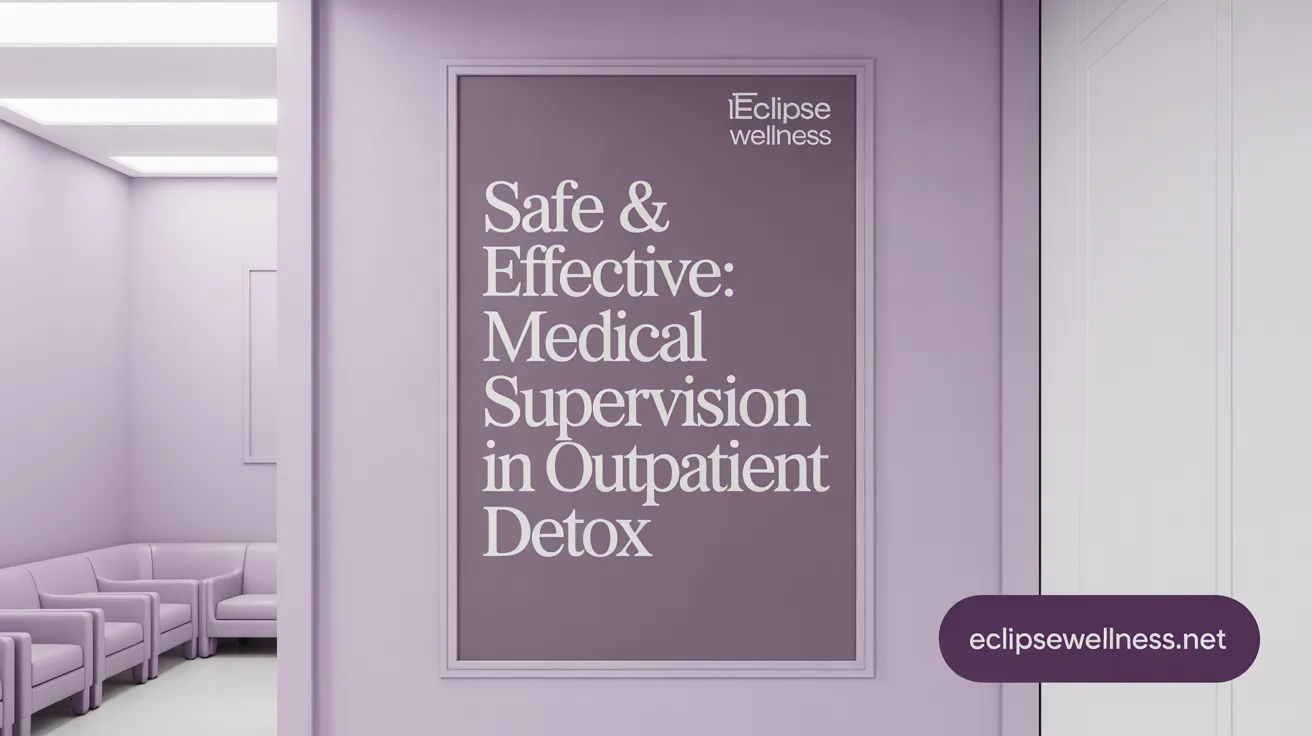Understanding Outpatient Detox Services
Outpatient detox services are a vital component in the spectrum of addiction recovery options. They offer medically supervised withdrawal from substances while allowing patients to remain in their home environment. This article explores the key benefits of outpatient detox programs, how they integrate into broader addiction treatment, and the factors influencing their effectiveness and suitability for various individuals.
What Is Outpatient Detox and How Does It Work?

Definition of outpatient detox
Outpatient detox is a medically supervised treatment process that helps individuals safely manage withdrawal symptoms from substances like alcohol, opioids, and benzodiazepines while allowing them to live at home. Unlike inpatient detox, patients do not stay overnight in a facility but attend scheduled daily sessions for medical assessments and therapy. For more details, see Outpatient Drug & Alcohol Detox Centers and Outpatient Detox Overview.
Typical process and duration
Outpatient detox programs generally last from 3 to 6 months. Treatment includes medical stabilization with medications to reduce withdrawal symptoms, individual and group therapy, family support, and flexible scheduling to accommodate daily responsibilities. Sessions average 9 to 15 hours of therapy per week. For therapy program types and intensities, see Intensive Outpatient Programs (IOPs) and Outpatient Rehab Therapy.
Comparison with inpatient detox
Inpatient detox requires residence at a detox center with 24/7 medical supervision, used for severe withdrawals with risk of complications such as seizures or hallucinations. Outpatient detox suits mild to moderate cases where patients have a stable home environment and support network. While inpatient offers constant monitoring, outpatient provides greater flexibility and lower costs. See Inpatient vs Outpatient Detox and Inpatient vs Outpatient Rehab for detailed comparisons.
Medical supervision in outpatient detox
Though patients live at home, outpatient detox involves close medical monitoring during visits, medication management, and psychological support to ensure safety and ease withdrawal symptoms. This supervised care reduces risks like relapse or complications while allowing patients to maintain their daily routines. For supervision details and medication management, refer to Outpatient detox benefits and Detox in Addiction Recovery.
Suitable candidates for outpatient detox
This approach is ideal for individuals with mild to moderate dependence, stable physical and mental health, a reliable support system, and motivation to engage in treatment. It is not recommended for those with severe addiction or serious withdrawal risk requiring continuous medical care. For patient selection criteria and suitability, see Outpatient Detox Overview and Settings for Substance Use Disorder Treatment.
Flexibility and Continuity: Balancing Life and Recovery

Ability to Maintain Daily Responsibilities
Outpatient detox programs stand out for their ability to allow patients to continue with everyday activities such as work, school, and family care. Unlike inpatient treatment where patients reside at the facility, outpatient services provide the freedom to return home after scheduled sessions. This advantage significantly benefits those who need to uphold daily obligations while pursuing recovery (Benefits of outpatient rehab centers in AZ, Benefits of outpatient addiction treatment).
Scheduling Flexibility
These programs offer flexible scheduling options including daytime, evening, or weekend sessions. Such flexibility is key for individuals balancing employment or educational commitments, enabling them to receive treatment without sacrificing their responsibilities. This adaptability also supports consistent attendance and engagement in therapy (Outpatient rehab benefits, Outpatient rehab effectiveness).
Integration of Therapy and Medication Management
Outpatient detox often includes a combination of individual and group therapy, medical monitoring, and medication-assisted treatments such as Suboxone or naltrexone. This comprehensive approach addresses both the physical and psychological aspects of withdrawal and recovery, ensuring continuing care while patients maintain their routines (Outpatient Rehab Therapy, Outpatient Drug & Alcohol Detox Centers).
Living at Home Versus Inpatient Residency
Patients benefit from living at home during outpatient detox, preserving familiar support systems and routines that aid motivation and comfort. Conversely, inpatient care offers a controlled environment with 24/7 supervision vital for severe addiction cases. Selection of outpatient detox is typically best for those with mild to moderate symptoms and a supportive home setting (Inpatient treatment programs, Alcohol detoxification overview).
Importance of a Stable Home Environment
A stable, safe home environment is crucial for outpatient detox success. It provides ongoing emotional support and reduces the risk factors that often trigger relapse. Medical professionals assess patient compatibility with outpatient detox based on home stability, motivation levels, and withdrawal severity to optimize treatment outcomes (Settings for Substance Use Disorder Treatment, Outpatient detox overview).
Overall, outpatient detox uniquely balances effective medical care with lifestyle continuity, helping individuals integrate recovery into everyday life while managing responsibilities effectively (Safe Addiction Recovery, Benefits of outpatient addiction treatment.
Cost-Effectiveness and Accessibility of Outpatient Detox
Comparative costs of outpatient versus inpatient programs
Outpatient detox programs generally cost significantly less than inpatient programs since patients do not require overnight stays. Inpatient rehab can range from around $2,000 to $40,000 per month due to 24/7 medical care and accommodation, whereas outpatient treatment costs often fall under $1,000 or up to $10,000 depending on the level of care and treatment duration. This cost difference makes outpatient detox an economically attractive option for many individuals. Learn more about Cost comparison outpatient and inpatient rehab and typical Cost of rehab programs.
Insurance coverage considerations
Many outpatient detox services accept insurance, making treatment more affordable. Government programs such as Medicaid and Medicare cover about 67% of outpatient treatment costs, including medication-assisted treatment (MAT) for opioid use disorders. Medicare Part B covers opioid treatment programs certified by SAMHSA, and Prescription Drug Plans (Part D) may cover certain addiction treatments. These coverages reduce out-of-pocket expenses and improve treatment accessibility. Detailed information is available on Medicare coverage for alcoholism and substance use disorder treatment and Insurance coverage for rehab.
Impact of affordability on access to treatment
Lower costs and insurance support enhance access to treatment for individuals who might otherwise face financial barriers. Because outpatient programs cater to those with stable home environments and mild-to-moderate withdrawal symptoms, the affordability factor allows many people balancing work, family, or schooling to pursue recovery without severe disruption. Explore the Benefits of outpatient addiction treatment and Outpatient treatment benefits for opioid addiction.
Agency resources facilitating access to outpatient detox
The Substance Abuse and Mental Health Services Administration (SAMHSA) provides nationwide resources such as confidential helplines (1-800-662-HELP), treatment locators, and evidence-based clinical guidelines, helping individuals find appropriate outpatient detox services. Public health initiatives supported by SAMHSA aim to expand behavioral health service accessibility and improve treatment outcomes. See SAMHSA free confidential helplines and SAMHSA data collection on substance use.
Community-based support and referrals
Community programs play a crucial role by providing referrals and support in outpatient settings. For example, state health departments and regional opioid treatment programs offer 24/7 access to medication-assisted treatments and peer support services. Peer and family specialists assist individuals in navigating recovery, which complements affordable outpatient detox and enhances sustained engagement in treatment. Additional information can be found at AHCCCS online Treatment Locator for opioid treatment programs and Peer and Family Support Services in Arizona.
Supporting Long-Term Recovery: Integration with Aftercare and Therapy

How Is Detox Connected to Ongoing Addiction Treatment?
Detoxification is only the first step in recovery, designed to safely manage withdrawal symptoms and stabilize patients physically. However, lasting recovery requires smooth transitions to ongoing treatment. Effective detox programs include careful discharge planning and patient education to prepare individuals for the next stages. For more information, see Detoxification to addiction treatment transition and Detox in Addiction Recovery.
What Role Does Outpatient Detox Play in Preventing Relapse?
Outpatient detox allows patients to manage withdrawal symptoms while continuing their daily responsibilities, making it easier to maintain stability. Though there’s a slightly higher relapse risk compared to inpatient detox due to greater access to triggers, outpatient programs mitigate this by incorporating ongoing support and personalized care to promote adherence and prevent relapse. Learn more from Outpatient Drug & Alcohol Detox Centers and Outpatient Detox Overview.
Why Are Counseling, Group Therapy, and Peer Support Essential?
After detox, outpatient treatment typically includes individual counseling, group therapy, and peer support such as 12-step meetings (AA and NA). These elements provide emotional support, teach coping skills, and foster community, which are crucial for maintaining sobriety and combating isolation. See Outpatient treatment for addiction and Treatment for Substance Use Disorders for detailed insights.
How Is Dual Diagnosis Addressed in Outpatient Care?
Outpatient programs often provide dual diagnosis treatment to simultaneously address substance use and co-occurring mental health disorders like anxiety, depression, or PTSD. This integrated approach improves recovery chances by treating all aspects of a patient’s health. More details are available at Outpatient treatment for addiction and Inpatient vs Outpatient Rehab.
What Strategies Help Transition from Detox to Further Recovery?
Successful transitions depend on timely discharge planning, care coordination, family involvement, and offering individualized treatment options. Outpatient care supports relapse prevention by maintaining patients in their home environment while gradually building recovery skills, bridging detox to longer-term therapy and support services. Additional resources include Detoxification to addiction treatment transition and Successful treatment completion outcomes.
Medical Safety and Effectiveness of Outpatient Detox

Managing withdrawal symptoms in outpatient settings
Outpatient detox programs medically supervise patients experiencing mild to moderate withdrawal symptoms. Patients attend daily or scheduled sessions during the day and return home at night, allowing continuation of daily activities. Medications are administered to ease symptoms such as anxiety, nausea, and increased heart rate, facilitating safer withdrawal while supporting comfort.
Use of medication-assisted treatment (MAT)
MAT plays a pivotal role in outpatient detox by combining medications like buprenorphine, methadone, or naltrexone with behavioral therapy to reduce cravings and withdrawal severity. This approach enhances detox completion rates and supports smoother transitions into subsequent addiction treatments.
Comparison of safety outcomes with inpatient detox
Research indicates outpatient detox approaches have similar safety outcomes compared to inpatient care for appropriately selected patients. Completion rates can be high, with studies reporting over 90% retention in outpatient alcohol detox programs for mild to moderate cases. However, inpatient detox remains essential for severe withdrawal or life-threatening symptoms. For detailed outcomes, see Outpatient vs Inpatient Detox.
Criteria for selecting outpatient versus inpatient detox
Choosing outpatient detox depends on factors such as the severity of substance dependence, presence of medical or psychiatric complications, stability and supportiveness of the home environment, and patient motivation. Severe withdrawal symptoms, complex medical issues, or unsafe home settings necessitate inpatient detox with 24/7 supervision. More about Patient Placement Criteria.
Importance of qualified medical supervision
Successful outpatient detox requires a multidisciplinary team including addiction specialists, medical providers, and counselors to monitor progress, manage complications, and provide psychological support. Medical supervision ensures timely intervention if withdrawal symptoms escalate or complications arise, safeguarding patient health throughout the detox process. Learn more from Detox in Addiction Recovery.
Role of Support Systems and Family Involvement in Outpatient Detox
Enhancing Recovery Through Family Support
Family involvement is a vital component in outpatient detox, offering emotional encouragement and stability crucial for sustained recovery. The support system helps individuals navigate challenges by providing motivation and accountability.
Opportunities for Family Therapy
Outpatient programs often incorporate family therapy sessions, which focus on improving communication, resolving conflicts, and educating families about addiction as a medical condition. This systemic approach benefits both the patient and their loved ones.
Benefits of Maintaining Social and Emotional Connections
Remaining connected to family and friends during outpatient detox fosters a sense of normalcy and belonging. These social ties can reduce feelings of isolation, improving emotional well-being and decreasing relapse risk.
Peer Support Groups Participation
Inclusion of support groups such as Alcoholics Anonymous (AA) or Narcotics Anonymous (NA) complements family involvement by providing shared experiences and additional encouragement from peers facing similar challenges.
Community Resources Aiding Outpatient Recovery
Many outpatient programs engage community resources including peer and family support specialists, to assist with legal, financial, and employment issues. These services create a comprehensive recovery environment reinforcing outpatient treatment success.
Personalization and Patient Empowerment in Outpatient Detox Programs

Individualized treatment planning
Outpatient detox programs prioritize creating treatment plans tailored to each individual's unique medical history, substance use patterns, and social circumstances. This personalized approach ensures that interventions meet specific patient needs, including the severity of withdrawal symptoms and co-occurring mental health disorders, enhancing the likelihood of successful detox and sustained recovery (Outpatient Drug & Alcohol Detox Centers, Outpatient rehabilitation).
Adapting treatment intensity to patient needs
Treatment intensity in outpatient settings is flexible, ranging from standard outpatient care to intensive outpatient programs (IOPs) and partial hospitalization programs (PHPs). This adaptability allows providers to adjust the amount of therapy, medical monitoring, and support based on the patient's progress and withdrawal severity, promoting safety and effectiveness without unnecessary restrictions (Substance abuse intensive outpatient programs, Outpatient Rehab Therapy).
Patient motivation and engagement
A critical factor in outpatient detox success is the patient's motivation to pursue recovery. Programs support engagement through regular counseling, peer support groups such as AA or NA, and involving family in therapy. Active participation empowers patients to take ownership of their recovery journey (Inpatient treatment programs, Benefits of outpatient rehab centers in AZ).
Use of evidence-based practices
Outpatient detox incorporates evidence-based treatments like medication-assisted treatment (MAT) to manage withdrawal symptoms safely and reduce cravings. Cognitive-behavioral therapy (CBT) and other psychological interventions address underlying addiction triggers and co-occurring disorders, providing a comprehensive approach (Use of evidence-based practices for outpatient detox, Outpatient Substance Abuse Treatment Benefits).
Advantages of patient autonomy and empowerment
Outpatient detox enables patients to maintain daily responsibilities, such as work or family care, fostering a sense of control and normalcy. Being able to stay at home while receiving treatment increases comfort and supports the application of coping strategies in real-life situations, which enhances patient confidence and long-term sobriety (Benefits of outpatient treatment for addiction, Outpatient rehabilitation benefits.
Why Outpatient Detox Is a Strong Choice for Many
Outpatient detox services offer a unique blend of medical safety, flexibility, affordability, and personalized care that makes them an effective option for individuals with mild to moderate substance dependence and stable support networks. By enabling patients to maintain daily commitments while receiving comprehensive treatment and support, outpatient detox fosters empowerment and practical skill-building essential for sustained recovery. While not suitable for everyone, these programs serve as a crucial stepping stone in the continuum of addiction care, promoting successful transitions to long-term recovery.
